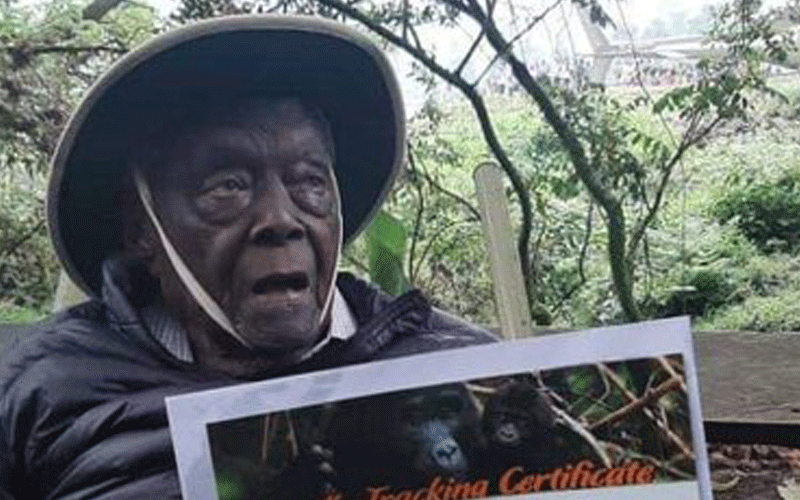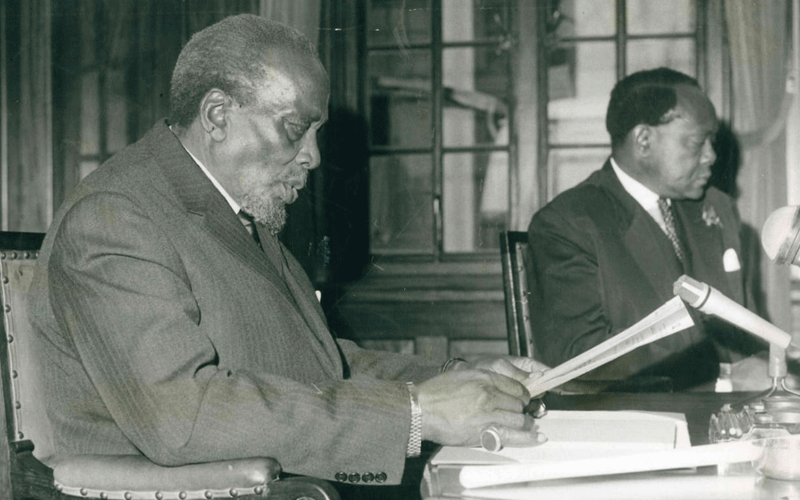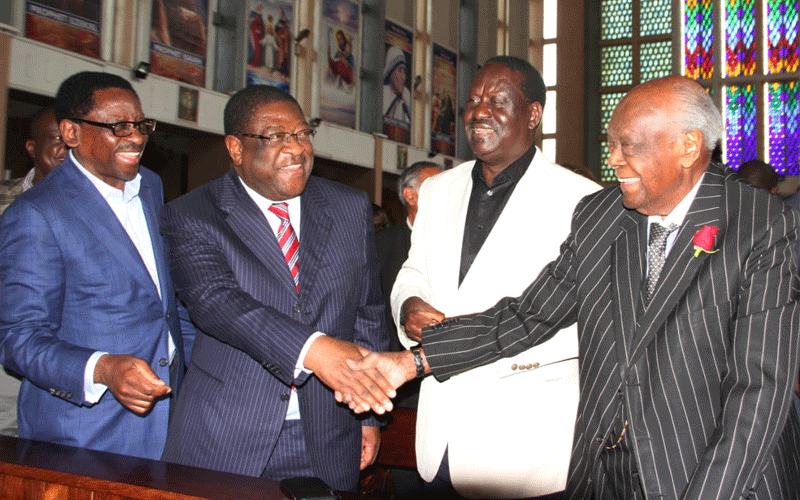Charles Njonjo: A 100 years of privilege, power and eccentricity

He is many things to many people. A towering witness to, and maker of, Kenya’s history, Charles Mugane Njonjo has lived and seen it all.
Njonjo has a special place in Kenya’s politics. He is among the few colonial era politicians who are still alive. He belongs to a class of the first managers of State affairs in post-independence Kenya.
Whether chequered or tempestuous, Njonjo has had a privileged life. He exudes aristocracy, epitomises finesse, oozes success, resents pettiness and preaches discipline and etiquette.
Born on January 23, 1920, to a colonial paramount chief and one of the first Africans to convert to Christianity and collaborators of British rule in Kenya, Njonjo turns one hundred years today.
Not many in his generation have hit the centenary milestone. He is five years older than retired President Daniel arap Moi and 11 years older than former President Mwai Kibaki. He came to prominence in 1963 when he was appointed independent Kenya’s first Attorney General by President Jomo Kenyatta.
In that role, he emerged the fiercest defender of Kenyatta’s regime and a master schemer in the intrigues that dogged that era. For that reason, he made as many friends as foes within and outside government.
And even some outside Kenya. He was blamed, particularly by Tanzania, for the collapse of the East African Community in 1977.
Nation’s foundations
He and Joseph Mboya are reputed as the key architects of the Kenyatta regime whose legal, economic and political foundations they played a pivotal role in laying. They include machinations such as the pushing out Jaramogi Oginga Odinga from the ruling party Kanu and eventually the vice presidency in 1966. 
An admirer of all things English, Njonjo, a highly private man, got married in 1972 at the age of 52 to Margaret Bryson. They have one child, Wairimu.
He is known to buy his suits from Saville Row cloth makers in London, the most conspicuous of his attire being the black-and-white stripped suit with ‘CN’ initials for his names.
From childhood, his family was close friends of Harry Leakey grandsons, Philip and Richard, who would later play important roles in Kenyan politics. Philip served in Moi’s government as Minister for Environment in the 1990s in addition to being the MP for Lang’ata in Nairobi while while Richard served as chairman of the Kenya Wildlife Service and later as Head of Civil Service and Secretary to the Cabinet.
Feared and revered in equal measure, Njonjo is known for his sense of humour but also a very dismissive, even arrogant demeanour.
Bearded sisters
He once came under heavy criticism for saying he would never visit, or even eat food from Kisumu, because he feared catching cholera which had hit the lakeside town then.
While serving as Minister for Constitutional Affairs, Njonjo famously came up with the Seven Bearded Sisters moniker for a group of vocal MPs. They were Martin Shikuku, Koigi wa Wamwere, Lawrence Sifuna, James Orengo, Abuya Abuya, Mwashengu wa Mwachofi and Chelagat Mutai.
Four decades later, there is no love lost between the few “sisters” who are still alive and Njonjo.
“As a graduate of Nyayo House torture chambers, I have absolutely no respect or admiration for Njonjo, just like Moi. I have no respect for him at all,” says Abuya Abuya, a former Kitutu East MP. 
Former Subukia MP Koigi wa Wamwere says the nickname was not meant to flatter them but rather to send an ominous warning to those who dared to speak against repression by the Moi regime.
“The statement gave the government an excuse to wage a crackdown on dissenting voices. After the 1982 aborted coup, some of the members of the group like James Orengo were exiled. Mwachofi and Abuya were demobilised while I was detained,” Koigi told People Daily.
Koigi said Njonjo’s actions destroyed the lives of many people.
“It turned the whole government against us and destroyed us,” says the former assistant minister in President Kibaki’s administration.
Njonjo started his life in present-day Kiambu county where he attended local primary schools before moving to Alliance High School.
He later enrolled at the University of Fort Hare in South Africa, where he studied law and graduated with a Bachelor’s degree. Among his contemporaries at the university was anti-apartheid hero and later South African President Nelson Mandela
After Fort Hare, he proceeded to Lincoln’s Inn in the UK to complete his law degree after which he came back to Kenya in 1955 and was appointed a legal clerk in the colonial government.
His return coincided with the State of Emergency, declared by colonial governor Sir Evelyn Baring in a bid to crush the Mau Mau insurgency.
He gained a reputation in the Colonial government as a diligent lawyer and was seconded to become Attorney General in Kenyatta’s government after independence.
In 1976, Njonjo decreed that it was treasonable to “imagine and encompass the death of the President”, an offence punishable by death.
Treason declaration
With the pronouncement, Njonjo put to a sudden end the Change-the-Constitution debate spearheaded by leaders of the powerful Gikuyu, Embu and Meru Association (Gema) led by Njenga Karume and Kihika Kimani with the intention of blocking then Vice-President Moi from succeeding Kenyatta.
In the same year, during a period of tense relations between Kenya and Uganda, Njonjo took part in secret negotiations with Israel that became instrumental in the success of the Israeli military’s Operation Entebbe.
The talks resulted in Kenya allowing Israeli to use Jomo Kenyatta International Airport as a base in the military assault on Entebbe Airport that ended a week-long hostage crisis involving Israeli Air passengers taken prisoners by a Palestinian Liberation Patriotic Front militants. 
Sir Charles Njonjo meets Raila Odinga, Amos Wako and James Orengo at a church service.
When Kenyatta died in 1978, Moi took over, thanks in part to Njonjo’s scheming.
In April 1980, he resigned as Attorney General to run for the Kikuyu parliamentary seat after the holder of the seat resigned. He was elected unchallenged and was soon after appointed minister for Constitutional Affairs, a newly created docket.
Three years later, he was not only out of the Kikuyu seat and the Cabinet but also out of a special place in Moi’s inner circle.
Njonjo’s fall began after the attempted coup of 1982, when Moi decided to purge Kanu and the Cabinet of people he perceived to plot against him.
Chief among them were Njonjo and powerful Internal Security minister GG Kariuki, now deceased.
Njonjo was dragged through a humiliating Judicial Commission of Inquiry, which concluded that he had abused his office and had indeed tried to overthrow Moi. Although the President pardoned him, Njonjo resigned both from his Cabinet position and Parliament.
He returned to public life in 1998 when Moi appointed him KWS chairman.
In 2006, there were indications Njonjo was attempting to influence politics, including his endorsement of Opposition leader Raila Odinga for the presidency.
Brief comeback
Though his net worth is not known to the public, it is believed Njonjo is one of the wealthiest Kenyans.
He has extensive properties across the country and business interests in high-profile financial institutions that include banks, insurance and the hospitality industry where he is associated with the Sankara Hotel in Nairobi’s Westlands suburb. It is a high end eatery.
Njonjo is reputed to be very generous. Apart from contributing to charities and other philanthropic causes, he is known to take a keen interest in the welfare of his workers, neighbours and relatives.
Even after leaving active politics in the early 1980s, Njonjo has remained very active. A lover of top range limousines, he reportedly still drives himself.
As part of engagements to celebrate his 100th birthday, Njonjo was last week in Uganda to track gorillas at the Mgahinga Gorilla National Park.
The Uganda Wildlife Authority’s awarded him a certificate for achieving the feat. Additional reporting by Emeka-Mayaka Gekara and Hillary Megeka






